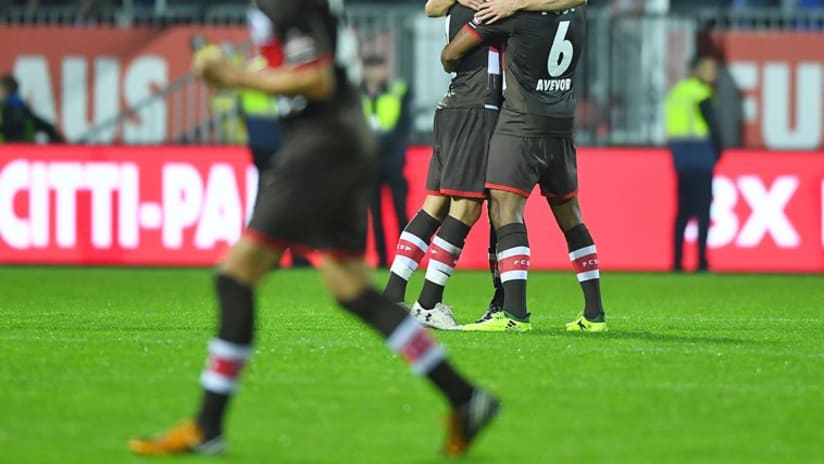FC St. Pauli 1910 is over a century old, with its soccer history going back to its origins with a Hamburg, Germany-based gymnastics club. But the true, modern identity of the club started emerging roughly 30 years ago, when an FCSP that had been defined by its rises and falls on the German soccer ladder began transcending its performances on the field. Come the 1980s, a club now more famous for is culture than its results began reflecting the unique, counter-culture environment of its slice of Hamburg.
That environment flourished in the Reeperbahn section of the club’s home district, as well as the Hafenstraße street from where the club’s current ethos originates. They’re places with communities that took started acting on their anti-establishment feel in the mid-1980s, their squatting neighborhood developing into leaders of anti-fascist, anti-nuclear proliferation, anti-racism … anti-almost anything that was linked to intolerance or consolidated power.
It was from there that St. Pauli adopted what’s now the club’s most prominent symbol: the skull and crossbones, imagery the has come to distinguish the team’s inner-core of supporters. Adopted by a fan named “Doc Mabuse,” who lived in the Hafenstraße while the club’s new identity formed, the traditional pirate symbol was meant to evoke the humility versus privilege, collective versus power, poor versus rich ideology of the supporters. Now, even as it has become part of the club’s business identity, the symbol acts as a reminder of how much the fans’ organic mentality has become inseparable from the club.
It’s the reason why FC St. Pauli is often referred as the Anarchists, though that nickname may go too far. Leftist, ultra-punk, anti-everything – they all capture a spirit that’s evolved over the last three decades, one that’s become a calling card beyond what happens on the field. Standing in contrast to their inner-city rivals, Hamburger SV, St. Pauli’s become an extension of what its community it represents, having explicitly incorporated the group’s values into the guiding principles of the club.
It was only once this ideology came to defined club culture that the legend of St. Pauli formed. Before that, the team’s existence was tied to its rollercoaster ride through the German leagues, with the ups and downs persisting from the first years of the 20th century into the decade before FCSP’s renaissance. In 1974, the club was in Germany’s third tier, the Regionaliga, before winning back-to-back promotions, only to be sent by down, again, the following year. Once reestablished in the 2. Bundesliga, the club lost its license and was sent tumbling further down the league ladder.
Over the last two decades, as the club’s raison d'etre has evolved, that ride has continued, with the club spending more time in the third division than the first. Since 2011, though, St. Pauli has established some stability at the second level, having survived a relegation scare this season to secure its eighth-straight year in the 2. Bundesliga.
From the outside, though, those results have taken a back seat to the culture the fanbase has fostered. The world over, St. Pauli supporters are known for the same values that grew out of the 1980s Reeperbahn, the squat houses of the Hafenstraße, and the first connections St. Pauli’s emerging communities made to their area’s club. They’re known for the skull and crossbones, emblazoned across the supporters’ section’s high, black, waving flag, reminding everyone that they support a club that’s come to represent the community which surrounds it.
In the locations St. Pauli has picked for their postseason tour, you can also see that ethos play out. In Detroit, 7,264 fans showed up to see their NPSL team, Detroit City FC, welcome another club whose supporters have crafted a defining roll. And in Portland, FCSP will play at the ground of one of the most famous and devoted fan bases in American soccer.
On Tuesday at Providence Park, St. Pauli will be facing Timbers 2 (Kickoff: 7:30pm PT), but perhaps more importantly, they will be experiencing soccer culture in Portland, where they’ll encounter a fanbase and community which, in the connection to their club, shares many of the same guiding principles as their own. It’s why St. Pauli is in the Rose City, and over the last 30-plus years, it’s what FCSP has been all about.












